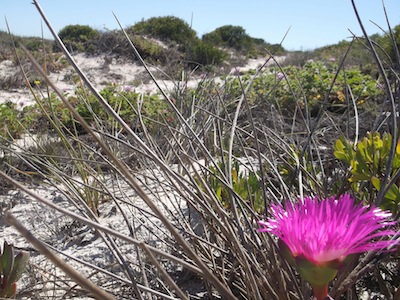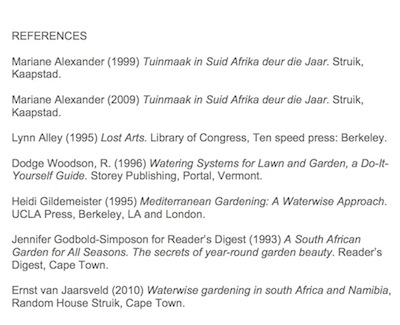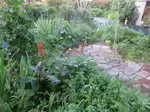Dear Reader, in this age of AI created content, please support with your goodwill someone who works harder to provide the human-made. Sign up at the top of the lefthand column or bottom of this page. You will receive my hand illustrated monthly newsletter RESTORE NATURE and access to the biodiversity garden design course as I write...and nothing else, I respect your time. I am also removing the advertizing as best I can as its become intrusive inappropriate and pays me nothing.
Deforestation and water loss from the environment over time
The effects of deforestation and water management through planting are worthy of consideration for many reasons.
This is the last in a series of 8 articles on water-wise gardening practice. I've excluded plant lists for the time being as they are not universally applicable, whereas water-wise gardening practice is more universal in the dry summer zones of the world. The first article was about the cleverness of drought adapted plants, and has links leading forward to all the other articles.
The formation of plant lists will be my next research task. Water-wise planting is so important that it has an impact on
 food, forest and a way forward in our drought stricken Cape
food, forest and a way forward in our drought stricken Capeclimate change. This can be shown through the effects of practicing the antithesis of water wisdom with plants in the past. This involved the removal of plant cover from the earth on a large scale or the replacement of the original vegetation with other vegetation which helped degrade the environment.
Deforestation and water-loss in ancient times
Gildemeister (1995) and some other authors outline bad water management practices relating to planting in years gone by that are thought provoking.
We think of environmental damage as a recent phenomenon, but Gildemeister points out that deforestation of the Mediterranean started with Solomon and the harvesting of the famous cedars of Lebanon. Loss of tree cover, starting with the wisest, but probably not water-wisest of men, caused erosion all around the Mediterranean.
Deforestation and water-deprivation through erosion changed the landscape of Greece in ancient times. Greece once had 60% forest cover. Now it has 3%. In a cookery book by Lynn Alley I found a quote from Plato in which he bemoans the desertification of Greece. What had once been ‘green meadows, woods and springs’ had become a rocky landscape within a few hundred years in the scramble to plant olive groves for the export trade around the 6th Century B.C. According to Alley (1995) removing the fibrous rooted forest trees like cork oaks and replacing them with olives which have a deep tap root encouraged erosion of the top soil. Greece became permanently rocky and dry with the progression of deforestation and water lost from the environment caused permanent local climate change.
Deforestation and water-loss perpetrated by colonialism
In South Africa the diary of van Riebeek, the first Dutch governor, records felling in forests around Table Mountain that no longer exist. The forests are discussed merely as exploitable resources as was the fashion of the nation at that time.
The diaries also mention chopping out the bulky roots of ‘bushes’ on the Cape flats for firewood. The bush clumps are Lilliputian or miniature forest canopies. In the search for fuel, the Dutch deforestation and water lost from hot sand caused environmental change.
By the time the British arrived the removal of bushes, actually deforestation and water loss from the sand caused a problem with shifting dunes that hindered transport. This ‘necessitated’ the importation of Australian pioneer plants to stabilize the sand. The alien plants invaded the flats and brought the rest of the lowland plant communities to the edge of extinction.The water hungry and invasive black wattles and Port Jackson willow are a problem to this day. One wonders about the connection between this deforestation, lack of water-wise planting and water shortage in Cape Town in the present.
The impact of man and deforestation and water cycle changes started much earlier. On a smaller scale with slower impact, giving time for recovery probably, the Khoekhoe burned areas of bush to encourage sweet grasses for grazing their cattle. However, they migrated yearly, giving the grass at least, a chance to recover, and preventing excessive erosion.
Probably the climax vegetation of the ravines on Table Mountain and spots along rivers on the flats was once forest. However our vegetation is adapted to twenty year burn cycles, except where it is protected by pure rock or deep ravines. Forests which survived the fires must have been rare and isolated. But then again, low forest or dune scrub, bush clumps and Milkwood forest survive for hundreds of years on the west coast, and in coastal valleys and rivers, like at Noordhoek. Perhaps there was a lot more forest cover once.
Deforestation and water shortage leading to climate change must have been hugely accelerated by colonization. The Dutch chopped down forests to repair ships and construct buildings, and started the fashion for constructing the 'gracht' or canal to get rain water to the sea as quickly as possible. The British brought in invasive plants.... and then there was good old Solly, the developmental modern thinker, who canalized and autobahned the 'wild marshes' of the two rivers which my father surveyed in their original state before construction began. My father told me about seas of reeds and waterbirds all the way from the lagoon that was once to Rondebosjie.
....and the delusions just won't die
I don't think we have yet recovered from the colonial era in South Africa. Its subjugating influence remains in our minds, and lurks in corners that don't get 'cleaned out' ideologically because we normally don't hold them under the microscope looking for signs of being colonized mentally. Gardening, except for the guerilla gardening and food security movements is often associated with privilege. There are areas in privileged gardening very resistant to change, which influence everyone. Destructive water practice is driven by the colonized
mindset even today.
I am speaking here not speculatively, but from observation, shocked observation, of my fellow white South Africans. There are people in South Africa who find the indigenous ‘African’ vegetation, that is drought adapted vegetation and Fynbos, ugly. There are those, even at the helm of our floral kingdom's management, which find a few indigenous specimens lovely and combine them in a lush showcase of so called indigenous gardening. But even those people often cannot imagine that our wild natural areas could be a model for gardening, because to have a grey and brown garden that doesn't need water and doesn't look like a British garden is just repugnant until you shift paradigms away from foreign models.
Many people preoccupied with water politics due to the drought do not even know that we have our own forest trees and support the preservation of water wasting exotic tree plantations. They believe them to be good for the environment because 'trees mean rain' in a simplistic formula. But different trees have different transpiration rates, and sometimes too much means water is literally sucked out of the ground, dropping the water table and drying streams up.
Then there are the garden designers who have learned some kind of formulaic do's and don'ts for successful garden planting. When building gardens their aesthetic ideal is an exotic fantasy of tropical greenness, palms and swimming-pools from some freshly 'discovered' island paradise (ouch for that colonial fantasy) or English greenness with lawns and roses like the gardens back home (ouch again). Funnily, Gildemeister (1995: 18) also sees the destructive effect of what she calls ‘British’ gardening aesthetics, and the desire for lawns and swimming pools on the Riviera, half way across the world. In about 1900 it began to replace the old more water-wise Mediterranean way of gardening.
Before the British influence spread on the Riviera, everyone had wells, and underground cisterns for storing rain water. Farmers raised dry crops, olives, carob and almond, wheat and fig. Drought also visits the Mediterranean because of erosion, bulldozing of tracts of land and removing the indigenous vegetation and replacing it with lawns (Gildemeister 1995:18). Fire is used to open woodlands for grazing.
Notably in California, I hear that almonds are not that hardy, and in the south near La Jolla the highways are now flanked by dead almond groves.
As in South Africa, global environmental change due to
combustion engines is only part of the damage being done to the climate by
humans.
The situation is not improved but compounded by toxic gardening knowledge creation. In the local library, the books on gardening in South Africa are full of pictures of impossible abundance and greenness, baroque floral displays and botanical excess, and all year round, drought or rain ! Over 90% of the discussed plant material is exotic, and 100% of the gardens are watered and fertilized excessively, way beyond the seasonal water supply of our different rainfall patterns. The little gardener in my area is overwhelmed and feels inadequate and does her best to emulate the 'high standards' set by the gardens of the rich in these coffee table books.
This is not helped by irrigation manuals written in Maine and Vermont, which are replete with assumptions about how one 'should' and 'must' water lawns, vast lawns even. Water sources discussed include mains, or drinking water and the only hindrance is whether the gardener can afford it, the advantage being its 'endless supply'. With the importation of exotic thinking about water, from areas of the world flooded with lakes and huge rivers, we are bound to end up being inappropriate in our water use. We are bound to have a large section of the rather uncritical thinkers who are land owners, stubbornly refusing to change as if having a lush garden was one of the basic human rights.
I feel these imported mindsets that dictate garden aesthetics by convention are not harmless or the personal prerogative and ownership right of the homeowner, they are dangerous and bring about ecological disaster. My next set of articles will outline a better way of planting that could reclaim this area from the scraggy arms of drought. At the very least, take a look at the local lawn replacement possibilities on the link below.

------
home page for useful links to practical information on natural gardening
------
natural garden design and its benefits
------
pictures of lawn replacements, mulches and native South African ground covers
You’re a home gardener ! Share your experiences and questions !
We all know about home gardening. Tell us about your successes, challenges and ask about issues that bother you. You may have the luxury of a back garden, but there are other ways we learn. Few people age without growing something or buying vegetables during their lives ! It is absolutely guaranteed that you have learned things which can help others on their gardening journey.
We invite you to share your stories, ask questions, because if a thing has bothered you it will bother others too. Someone may have a solution ! No question is too small. There is learning for everyone involved, for you, for me (yes, I learn from every question), for us all. Exciting stuff !
We are starting on a new journey. Every week we will profile your letters ! The best stories and questions we receive.
Restore Nature Newsletter
I've been writing for four years now and I would love to hear from you
Please let me know if you have any questions, comments or stories to share on gardening, permaculture, regenerative agriculture, food forests, natural gardening, do nothing gardening, observations about pests and diseases, foraging, dealing with and using weeds constructively, composting and going offgrid.
SEARCH
Order the Kindle E-book for the SPECIAL PRICE of only
Prices valid till 30.09.2023
Recent Articles
-
garden for life is a blog about saving the earth one garden at a time
Apr 18, 25 01:18 PM
The garden for life blog has short articles on gardening for biodiversity with native plants and regenerating soil for climate amelioration and nutritious food -
Cape Flats Sand Fynbos, Cape Town's most endangered native vegetation!
Apr 18, 25 10:36 AM
Cape Flats Sand Fynbos, a vegetation type found in the super diverse Cape Fynbos region is threatened by Cape Town's urban development and invasive alien plants -
Geography Research Task
Jan 31, 25 11:37 PM
To whom it may concern My name is Tanyaradzwa Madziwa and I am a matric student at Springfield Convent School. As part of our geography syllabus for this
"How to start a profitable worm business on a shoestring budget
Order a printed copy from "Amazon" at the SPECIAL PRICE of only
or a digital version from the "Kindle" store at the SPECIAL PRICE of only
Prices valid till 30.09.2023







